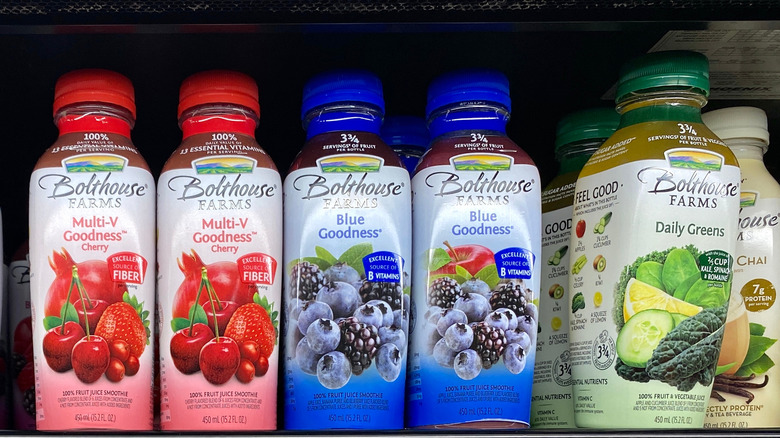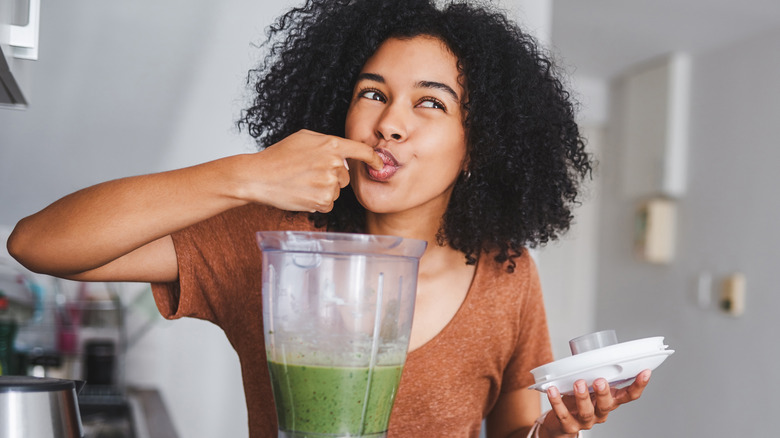Are Premade Smoothies Actually Good For You? Here's What We Know
Smoothies are an easy way to sneak a little more nutrition into your diet. Whether you enjoy a tangy fruit smoothie to help you wake up in the morning or a greens-based smoothie to help tie you over until dinner, you have many healthy options for making a smoothie at home.
But we all can't carry around a Vitamix blender, and those portable blenders don't account for the mess you can make on your counter (or your desk). Besides, you still have to cart around your smoothie's ingredients, not to mention find ways to keep them cold. Many companies offer premade smoothies that you can pick up at the grocery store or a convenience store. You can also get a fresh smoothie made to order at the many smoothie bars and stores.
Although the building block of a smoothie — fruit — might make you believe all smoothies are healthy, many premade smoothies are loaded with sugar and don't necessarily have the fruit you might find in your homemade smoothie. Some smoothie bars can add frozen yogurt, sherbet, or other juices that add to the calorie and sugar content. Let's look at some of the ingredients.
Premade smoothies use mostly juices from other fruits
Bolthouse Farms' Berry Boost boasts no artificial flavors, colors, or preservatives, and claims it provides you with almost four servings of fruit. With a name like Berry Boost, you'd think that berries would be the first ingredient. But no — the first two ingredients are apple puree and apple juice. Although this premade smoothie has no added sugar, it has 47 grams of sugar and 230 calories.
Similarly, you might think you're getting a good amount of greens in a Green Goodness smoothie from Bolthouse Farms. Although it lists spinach, broccoli, barley grass, and wheatgrass in its ingredients, these aren't listed first. The first three ingredients are pineapple, apple juice, and mango puree. There is no added sugar in this smoothie, but you'll get 46 grams of sugar from these juices.
Naked's Superfood Machine also relies on juice from apples, oranges, bananas, cherries, acai, and acerola cherries. A 270-calorie serving will give you 2 grams of fiber and a whopping 58 grams of sugar. According to MedicineNet, premade smoothies like these are good because they often don't have synthetic flavors, ingredients, or additives while still giving you some antioxidant power. However, many of them have more calories (and sugar) while lacking the fiber to fill you until your next meal.
Smoothie bars give you actual fruit, but with other ingredients
Nutritional information from smoothie cafes can be kind of tricky because you don't know what else might be added to your smoothie. An Acai Berry Boost from Tropical Smoothie Cafe gives you acai, pomegranate, banana, blueberries, and strawberries. This 470-calorie smoothie gives you 5 grams of fat and 101 grams of sugar. Although the nutritional information doesn't differentiate total sugar from added sugar, the Splenda version of this smoothie has 47 grams of sugar, which suggests that the regular version of the Acai Berry could have 54 grams of added sugar. The American Heart Association suggests no more than 36 grams of added sugar a day for men and 25 grams for women.
The Vinnie Del Rocco from Planet Smoothie has antioxidant-rich raspberries, blueberries, and strawberries. A 20-ounce serving has 310 calories, 6 grams of fiber, 64 grams of sugar, and 51 grams of added sugar. Where does the added sugar come from? Orange sherbet. The Twig and Berries smoothie has 8 grams of fiber but 28 grams of added sugar from frozen yogurt.
Create a healthier smoothie at home
Sure, premade smoothies and smoothie stores can offer convenient ways to get quick nutrition, but if convenience is an issue, you could pack a smoothie bowl from home. Yet if you still like the texture of a smoothie without the unnecessary (and unhealthy) extras, you can make a healthier version of some of these smoothies at home with less sugar and calories. To make a version of the Vinnie Del Rocco at home, start with half a banana and ½ cup each of blueberries, raspberries, and strawberries. That will give you a good smoothie base of 151 calories, 9 grams of fiber, and 21 grams of sugar. From there, you can build your smoothie's nutritional value by adding other ingredients.
Adding a little spinach or kale to a smoothie will give you more fiber, plus folate and phytonutrients (via Cleveland Clinic). It'll change the color of your smoothie a bit, but it will also add a little more texture without interfering with the tart and sweetness of the berries. Protein will also help keep you full, so try unsweetened Greek yogurt, tofu, chickpeas, or protein powder. Although plant-based fats like nut butters, seeds, or avocado will add more calories, these fats are great for your heart health. Lastly, add some ice to your smoothie to add volume and thickness (via NBC News).




